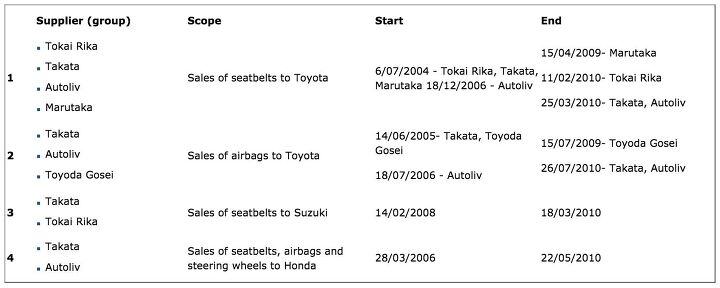Car, Tell: Quintet of Safety Suppliers Fined for Price Fixing

It appears the fictional JR Ewing isn’t the only one having to deal with cartels. Antitrust regulators in the EU have fined five safety equipment suppliers a combined 34 million euros ($40 million) for taking part in a scheme to fix prices for seat belts and airbags sold to Japanese automakers.
The cartels were allegedly supplying the safety equipment to Toyota, Suzuki, and Honda at inflated prices between calendar years 2004 and 2010.
Reuters reports an investigation spanning the last six years began with raids of facilities associated with the cartels in June 2011, culminating in the fines levied with this decision.
Penalties to the individual companies range from 156,000 euros to 12.7 million euros. The largest amount was levied at a company already well known for causing headaches to manufacturers who used its safety products: Takata.
Takata, the supplier of millions of airbags that seemed to do more harm than good, filed for bankruptcy earlier this year. The total global liabilities the supplier has to endure is well into the billions. A research company in Tokyo claims Takata’s total liabilities for ongoing recalls, penalties, and settlements is likely somewhere in the neighborhood of $15 billion. What’s another few million tossed on top of that, then?
However, according to the Commission report, Takata received full immunity for revealing three of the cartels (thereby avoiding an aggregate fine of approximately 74 million euros.
Commissioner Margrethe Vestager, in charge of competition policy said: “The five suppliers fined today colluded to maximise their profits from the sale of these components. This may have raised the costs of these car parts for a number of manufacturers selling cars in Europe, potentially affecting consumers.” Fixing the prices of anything is shady; teaming up to make extra coin on important safety equipment is even shadier.
The Commission’s investigation revealed the existence of four separate infringements. The following table details the participation and the duration of each company’s involvement in each of the four infringements:
Regulatory bodies are seeming to be cracking down on this type of nefarious activity with newfound force. Witness the raid on Daimler and BMW offices this past summer, carried out on suspicion there was a conspiracy to fix prices in diesel and other technologies. Companies which fudge fuel economy numbers have also come under the microscope.

Matthew buys, sells, fixes, & races cars. As a human index of auto & auction knowledge, he is fond of making money and offering loud opinions.
More by Matthew Guy
Latest Car Reviews
Read moreLatest Product Reviews
Read moreRecent Comments
- ToolGuy Good for them, good for me.
- Tassos While I have been a very satisfied Accord Coupe and CIvic Hatch (both 5-speed) owner for decades (1994-2017 and 1991-2016 respectively), Honda has made a ton of errors later.Its EVs are GM clones. That alone is sufficient for them to sink like a stone. They will bleed billions, and will take them from the billions they make of the Civic, Accord, CRV and Pilot.Its other EVs will be overpriced as most Hondas, and few will buy them. I'd put my money on TOyota and his Hybrid and Plug-in strategy, until breaktrhus significantly improve EVs price and ease of use, so that anybody can have an EV as one's sole car.
- ToolGuy Good for Honda, good for Canada.Bad for Ohio, how could my President let this happen? lol
- Tassos A terrible bargain, as are all of Tim's finds, unless they can be had at 1/2 or 1/5th the asking price.For this fugly pig, I would not buy it at any price. My time is too valuable to flip ugly Mitsus.FOr those who know these models, is that silly spoiler in the trunk really functional? And is its size the best for optimizing performance? Really? Why do we never see a GTI or other "hot hatches' and poor man's M3s similarly fitted? Is the EVO trying to pose as a short and fat 70s ROadrunner?Beep beep!
- Carson D Even Tesla can't make money on EVs anymore. There are far too many being produced, and nowhere near enough people who will settle for one voluntarily. Command economies produce these results. Anyone who thinks that they're smarter than a free market at allocating resources has already revealed that they are not.



































Comments
Join the conversation
You have to pay extra for Japanese reliability, even in Europe.